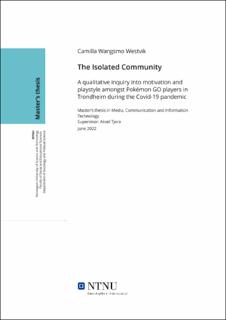| dc.contributor.advisor | Aksel Tjora | |
| dc.contributor.author | Camilla Wangsmo Westvik | |
| dc.date.accessioned | 2022-07-14T17:20:34Z | |
| dc.date.available | 2022-07-14T17:20:34Z | |
| dc.date.issued | 2022 | |
| dc.identifier | no.ntnu:inspera:104662308:35448794 | |
| dc.identifier.uri | https://hdl.handle.net/11250/3005576 | |
| dc.description.abstract | Denne undersøkelsen utforsker motivasjonsendringer blant spillere av Pokémon GO - et augmented reality (AR) lokasjonsbasert spill (LBG) - under covid-19 pandemien i Trondheim. Hovedproblemstillingen er: “Hvilke faktorer påvirker motivasjonen hos Pokémon GO spillere i Trondheim?”. I tillegg undersøkes også effekten av sosial distansering og Niantic sine spill-tekniske endringer på motivasjon og spillestil under pandemien. En metode basert på stegvis-deduktiv induktiv metode har ledet til generering av fire hovedtema for analysen; (1) hvordan differensierer motivasjonsfaktorer mellom generasjonene, og hvordan støtter spillet spillernes behovsdekning for (2) autonomi, (3) kompetanse og (4) tilhørighet? Resultatene viser at de implementerte spill-tekniske endringene har forandret spillets grunnleggende natur, fra å insentivere fysisk aktivitet og sosial interaksjon, til å insentivere fysisk og sosialt isolert spilling. Dette har ført til en endring i spillkultur, indusert av en endring i kollektive kulturelle praksiser. Disse endringene i kollektive praksiser har lagt til rette for en signifikant økning i personlig autonomi, samtidig som en reduksjon i tilhørighet, som har resultert i isolasjons-indusert autonomi. Reduksjonen i tilhørighet har ført til en substansiell nedgang i fellesskapsfølelse blant spillerne, som blir forsterket av tilstedeværelsen av de spill-tekniske endringene. Som et resultat av dette, har Pokémon GO blitt et isolert felleskap under pandemien. | |
| dc.description.abstract | This inquiry explores motivational changes amongst players of Pokémon GO - an augmented-reality (AR) location-based game (LBG) - during the covid-19 pandemic in Trondheim. The main research question is: “What factors affect motivation amongst players of Pokémon GO in Trondheim”. In addition, the inquiry investigates the effects of social distancing and Niantic’s implemented countermeasures on motivation and playstyle during the pandemic. A methodology based in a stepwise-deductive inductive method led to the generation of four main themes for analysis: (1) how does motivation differentiate between generations, and how does the game support players’ need-satisfaction in regards to (2) autonomy, (3) competence and (4) relatedness? The results show that the implemented countermeasures have changed the basic nature of the game, from incentivising physical movement and social interaction, to incentivising physically and socially isolated play. This has led to a change in gameplay culture, induced by a change in collective cultural practices. This change in collective practices has facilitated a substantial increase in player autonomy, while at the same time decreasing the relatedness of players, resulting in isolation-induced autonomy. The decrease in relatedness has led to a significant decrease in community feeling amongst its players, facilitated by the prolonged presence of the countermeasures. As a result, the Pokémon GO community has effectively been reshaped into an isolated community. | |
| dc.language | eng | |
| dc.publisher | NTNU | |
| dc.title | The Isolated Community - a qualitative inquiry into motivation and playstyle amongst Pokémon GO players in Trondheim during the Covid-19 pandemic | |
| dc.type | Master thesis | |
